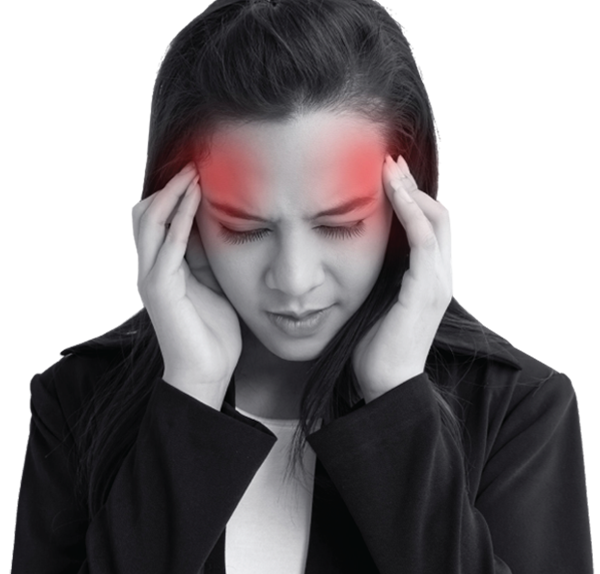Headaches Expert in Perumbakkam
Your Trusted Partner in Headaches
A headache is a pain in your head or face that’s often described as a pressure that’s throbbing, constant, sharp or dul. We are here to provide you with top-notch care and guidance to tackle your problems.

Understanding Headaches
Casuses of Headaches
- Stress
- Muscular tension
- Dental or jaw problems
- Infections
- Diet
- Eye problems
- Hormonal influences
- Medications
- Disorders of the ear, nose or throat
- Disorders of the nervous system
- Injury to the head, neck or spine
- High blood pressure
- Poor posture – puts unnecessary strain on the muscles of the back and neck
- Hangover from abuse of alcohol or drugs
- Temperature – extremes of heat or cold
- Dehydration – affects blood pressure
- Noise – especially loud noises
- Temporal arteritis – inflammation of the artery at the temple, most common in elderly people
- Arthritis
What is the main cause of a Headache?
Headache pain results from signals interacting among your brain, blood vessels and surrounding nerves. During a headache, multiple mechanisms activate specific nerves that affect muscles and blood vessels. These nerves send pain signals to your brain, causing a headache.
Are headaches Hereditary?
Headaches tend to run in families, especially migraines. Children who have migraines usually have at least one biological parent who also experiences them. In fact, kids whose parents have migraines are up to four times more likely to develop them.
Headaches can also be triggered by environmental factors shared in a family’s household, such as:
- Eating certain foods or ingredients, like caffeine, alcohol, fermented foods, chocolate and cheese.
- Exposure to allergens.
- Secondhand smoke.
- Strong odors from household chemicals or perfumes.

Symptoms of Headaches:
- A sudden, new and severe headache
- Headache with a fever, shortness of breath, stiff neck or rash
- Headaches that occur after a head injury or accident
- Slow onset of the headache.
- Head usually hurts on both sides
- Pain is dull or feels like a band
Treatments
Over-the-Counter Pain Relievers: Non-prescription pain relievers like acetaminophen (Tylenol), ibuprofen (Advil, Motrin), and aspirin can help alleviate mild to moderate tension headaches and migraines. Follow the dosing instructions on the medication label.
Caffeine: Caffeine can enhance the effectiveness of pain relievers and is sometimes included in headache medications. However, excessive caffeine consumption can lead to rebound headaches, so use it cautiously.
Relaxation Techniques: Stress and tension can trigger headaches. Practicing relaxation techniques like deep breathing, meditation, or progressive muscle relaxation can help reduce stress and relieve tension headaches.
Hydration: Dehydration can contribute to headaches. Ensure you are adequately hydrated by drinking water throughout the day. If you suspect dehydration is a factor, consider drinking an oral rehydration solution.
Rest and Sleep: Lack of sleep or disrupted sleep patterns can lead to headaches. Try to maintain a regular sleep schedule and ensure you get enough quality sleep.
Avoid Triggers: Identify and avoid specific triggers that may be causing your headaches. Common triggers include certain foods, alcohol, caffeine, and environmental factors like strong odors or bright lights.
Lifestyle Modifications:: Making healthy lifestyle choices, such as maintaining a balanced diet, regular exercise, and managing stress, can help reduce the frequency and intensity of headaches.
Cold Compress: Applying a cold compress to your forehead or the back of your neck can provide relief for tension headaches.
Warm Compress: For sinus headaches or headaches due to muscle tension, a warm compress may be more soothing.
Warm Compress: For sinus headaches or headaches due to muscle tension, a warm compress may be more soothing.
Acupressure or Massage: Gentle pressure on specific points on the body may help relieve tension and headache symptoms.
Frequently Asked Question on Headaches
Most headaches begin in the many nerves of the muscles and blood vessels that surround your head, neck, and face. These pain-sensing nerves can be set off by stress, muscle tension, enlarged blood vessels, and other triggers
Headaches are extremely common. Nearly everyone has a headache occasionally. When they occur repeatedly, they are a symptom of a headache disorder.
These include aspirin, ibuprofen (Advil, Motrin IB, others) and naproxen sodium (Aleve). Combination medicines. Aspirin, acetaminophen (Tylenol, others) or both are often combined with caffeine or a sedative in a single medicine. Combination medicines may be more effective than single-ingredient pain relievers
A persistent headache can result from an injury or a structural problem in the spine, such as arthritis. It can also affect people who have migraine or have had a stroke. The overuse of pain relief drugs can also cause an ongoing headache.
Yes, Dolo 650 or paracetamol has analgesic effect can be taken for headache. It helps in decreasing pains, mainly headaches, migraine, kind of headaches and tension type of headaches.
